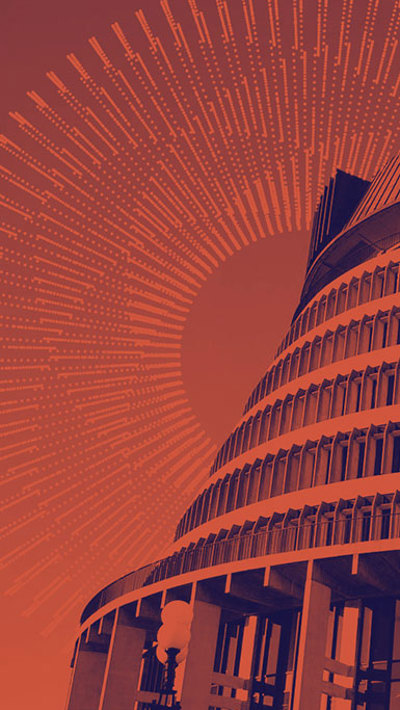Contents
As the weather effects of climate change seem to intensify and public opinion hardens, both in our export markets and at home, the imperative is building on political parties to present a credible path to a low carbon economy. We look at the policies on offer this election from Labour, National, the Greens and ACT.
We have not included New Zealand First, even though it may once again be a party in government, because we expect that New Zealand First would do next time what it did this time – claim some policy trophies (Provincial Growth Fund, the investigation into moving Ports of Auckland to Northland), score some big funding boosts for New Zealand First held Ministerial portfolios, and act as a brake on “bad ideas”.
We are taking an issues-based approach to our Election Series 2020. Our first instalment looked at the competing strategies to get the budget back into black and we will conclude with how the parties plan to build back better.
Whatever the election result, the next government will come under increasing – and increasingly specific – pressure to reduce emissions as the reporting obligations under the Zero Carbon Act come into play and the information around climate risk becomes more sophisticated and more granular. The Climate Change Commission will present its first emissions budget on 31 May 2021 and the first National Adaptation Plan is set to be published by August 2022.
There may be further policy announcements to come as the election campaign rolls on, which we have not been able to capture here.
The path to a low carbon economy
Zero Carbon Act
| Labour | Greens | National | ACT |
| Maintain in current form |
Maintain in current form Implement emissions budgets |
National would amend the Act to limit damage to the economy, including:
|
Repeal the Act and implement a carbon price tied to the average of New Zealand’s five main trading partners |
Emissions Trading Scheme (ETS)
| Labour | Greens | National | ACT |
|
Maintain reforms made this term |
Commit to sufficient action to limit warming to 1.5°C Price agricultural emissions |
Investigate carbon capture and storage and recognise it in the ETS Review the treatment of forestry |
Provide carbon credits for wood products that store carbon for 50 years |
Ban on new drilling offshore and onshore outside Taranaki
| Labour | Greens | National | ACT |
|
Maintain |
Extend to new fossil fuel extraction permits onshore as well as offshore |
Reverse |
Reverse |
Renewable energy
| Labour | Greens | National | ACT |
|
100% renewable electricity generation by 2030 (five years ahead of current target) with a review at the 2025 emissions budget $70m to investigate pumped hydro at Lake Onslow as a dry year solution, subject to a suitable business case Ban new fossil fuel electricity baseload generation Almost $20m in additional funding for a clean energy research platform New National Policy Statement (NPS) for Renewable Energy Generation to remove barriers of development |
100% renewable electricity generation by 2030 Green Energy Plan to promote solar energy 250 MW of additional solar capacity $1.27b towards solar and batteries on all suitable state houses Create a $250m Clean Energy Fund for local renewable energy projects Simplify planning rules to make it easier to build wind turbines Work toward ending fossil fuel subsidies Create an RMA National Environmental Standard to support new wind energy generation, revise the existing NPS on renewable electricity generation to make it easier to upgrade existing windfarms Work with Transpower to support faster grid upgrades with a fairer cost sharing regime, requiring collaboration between lines companies |
No target but will “continue to support the development of new opportunities such as hydrogen, offshore wind, biomass and biofuels” |
No target |
Transport
| Labour | Greens | National | ACT |
|
A nationwide roll-out of hydrogen refuelling stations to support the uptake of zero emissions vehicles Increase funding to support businesses to use low emissions vehicles Require new vehicles to meet fuel efficiency standards Decarbonise the public bus fleet by 2035 |
Ban new fossil fuel cars, vans and utes whenever the UK does Pursue the feebate scheme Nationwide EV charging network $1.5b for new “Cycle Super Highways” in major cities Regularly update vehicle emission standards and introduce in-service vehicle emission requirements Require commercially available diesel to be blended with 7% biofuel for the heavy vehicle fleet Exempt heavy vehicles fuelled by hydrogen from road user charges Invest in rapid intercity passenger rail across the country and support the electrification of the North Island Main Trunk Line |
Exempt EVs from road user charges until at least 2023 and from Fringe Benefit Tax until 2025 Allow EVs to use bus and high occupancy lanes One third of the government’s light vehicle fleet to be electric by 2023 |
Ask MPs to cut flights to Wellington by 25% |
Industrial processes and construction
| Labour | Greens | National | ACT |
|
Ban new coal fired boilers for all but the highest temperature applications $70m fund to help major industrial users decarbonise Continue programme to reduce carbon emissions from construction |
Ban new industrial coal boilers within the first 100 days, phase out industrial coal use by 2030 and industrial gas use by 2035 Treble support for businesses to replace coal and gas with clean alternatives Amend Building Act to make new buildings zero energy by 2030 |
Fuel neutral approach which regulates greenhouse gas emissions but does not tell people what fuels they can use |
|
Agriculture
| Labour | Greens | National | ACT |
|
Keep working with farmers on Waka Eke Noa, the government-industry partnership to reduce emissions on the farm |
Price agricultural emissions at the farm gate $297m Healthy Food and Farming Fund to help farmers move to low emissions agriculture Levy on the use of nitrogen and phosphorus fertilisers |
Split emissions budgets between biogenic methane and CO2 Scrap the 2022 mandatory review that might bring agricultural emissions into the ETS pre-2025 Continue Waka Eke Noa |
Reverse agricultural methane and freshwater reforms Allow genetic engineering |








































